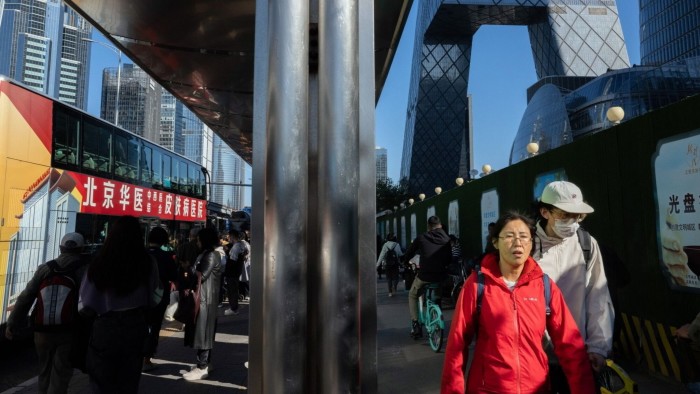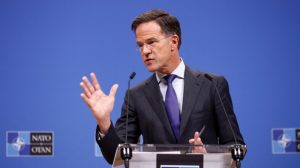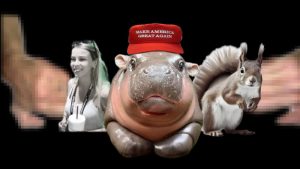Western businesses in China hold on to hopes for Trump 2.0

Unlock the White House Watch newsletter for free
Your guide to what the 2024 US election means for Washington and the world
Less than a day after Trump’s election victory clouded the outlook for tariff-free trade, one adviser to international companies in mainland China was already looking for the silver lining.
On the sidelines of Shanghai’s biggest trade fair, Cameron Johnson pointed to an interview with the president-elect in Chicago in October. “There are no tariffs,” said Trump, in response to a question about the risk of the “biggest trade war” since the 1930s. “All you have to do is build your plant in the United States and you don’t have any tariffs”. Johnson, a senior partner at Tidalwave Solutions, says this could encourage more Chinese businesses to expand into the US.
Trump campaigned on a platform of tariffs on Chinese products and looks set to intensify a trade war initiated under his first term. He declared last month he would impose tariffs of 25 per cent on all imports from Canada and Mexico, and an extra 10 per cent on Chinese goods. However, a contrarian case has already taken shape among some in the China-related US business community on both sides of the Pacific.
“We have taken the view that a Donald Trump second term could very well be good for US-China relations, which I recognise is counterintuitive or not the consensus,” says David Adelman, an adviser to ETF provider Kraneshares which specialises in US-listed China and carbon-related stocks, and a former US ambassador to Singapore.
“There’s the potential for a Nixon goes to China moment for Donald Trump,” he adds. “No one will ever accuse Trump of being soft on China, which puts him in a strong position to negotiate a mutually beneficial deal with Beijing”.
Regardless of what happens next, the speculation reflects how deeply the world has changed in recent decades. International business flocked to China because of its low-cost manufacturing and infrastructure. Now its industrial technology poses a competitive challenge.
The optimistic case for those seeking closer US-China ties is that under Trump, Chinese companies would agree to invest directly in the US to gain tariff-free access to its consumer market. Such a strategy could involve protectionist restrictions on their presence that echo parallel constraints in force in mainland China since its opening in the 1980s. The EU’s plans to demand technology transfers from Chinese companies follows the same logic.
Kent D Kedl, head of consultancy Blue Ocean Advisors, says the prospect of a deal is “totally unknown at this point” given uncertainty around Trump’s approach. But he suggests the incoming president will be “flexible on policy”, adjusting his position if a Chinese company, say, promised to invest $5bn in the US and create 10,000 jobs. “You don’t think he’s going to take the win on that?” he says.
Adelman adds that Trump views himself as a “grand dealmaker” and points to “the only US-China trade deal in recent memory”, which was struck at the end of the incoming president’s first term in 2020. He expects “that any sort of aggressive activity on new tariffs or export controls will be part of a longer-term attempt to create the right conditions for a big US-China deal”.
As part of that so-called phase one trade deal, China allowed foreign investment banks to take full ownership of their companies in the mainland, that had previously needed to operate as joint ventures, earlier than expected. Optimists are in essence hoping for phase two.
Like any other theory, this one may struggle to survive exposure to the real world. Big Chinese companies, if they did expand in America, would face not only punitive costs relative to other markets, but increasingly hostile political territory. Beijing, also, is unlikely to be eager to share its own technology. And even if there is a convergence on paper, the deal may not work out exactly as planned, especially as the American and Chinese economic systems in other respects diverge. Despite the concessions from the phase one deal, US banks have struggled in recent years in China along with domestic counterparts amid a shift away from private-sector finance and towards high-level industrial policy.
Such developments, alongside weaker economic momentum, have made it a struggle for US business representatives to persuade investors, clients and bosses of China’s enduring appeal. “It’s not the investment it used to be,” admits Kedl. Beyond trade, concerns have also risen over the potential for conflict between the US and China. But for Johnson, a trade deal could ease that threat. “Imagine if there were 10,000 Chinese companies in the States,” he says. “That’s a hell of a deterrent”.
#Western #businesses #China #hold #hopes #Trump




